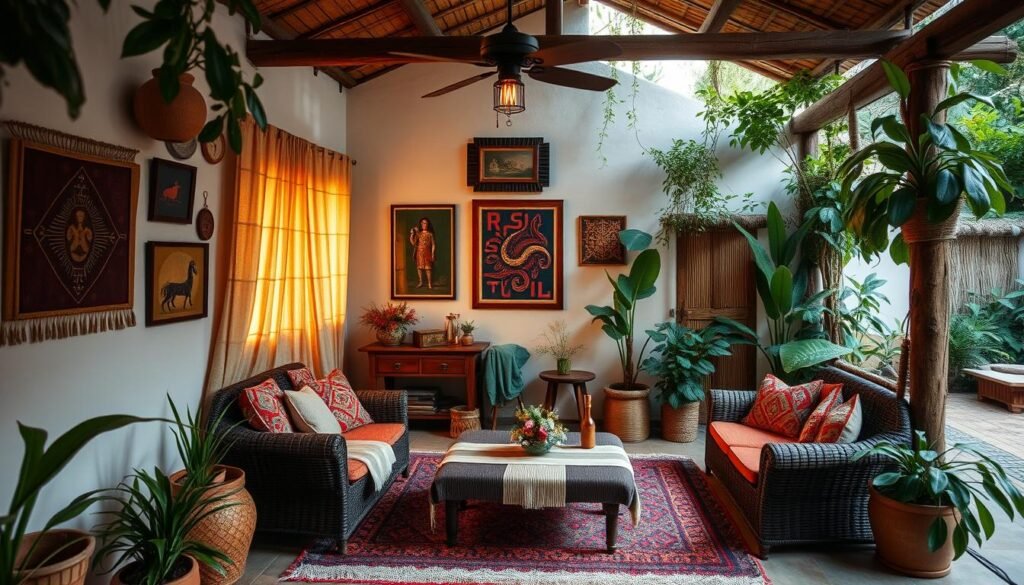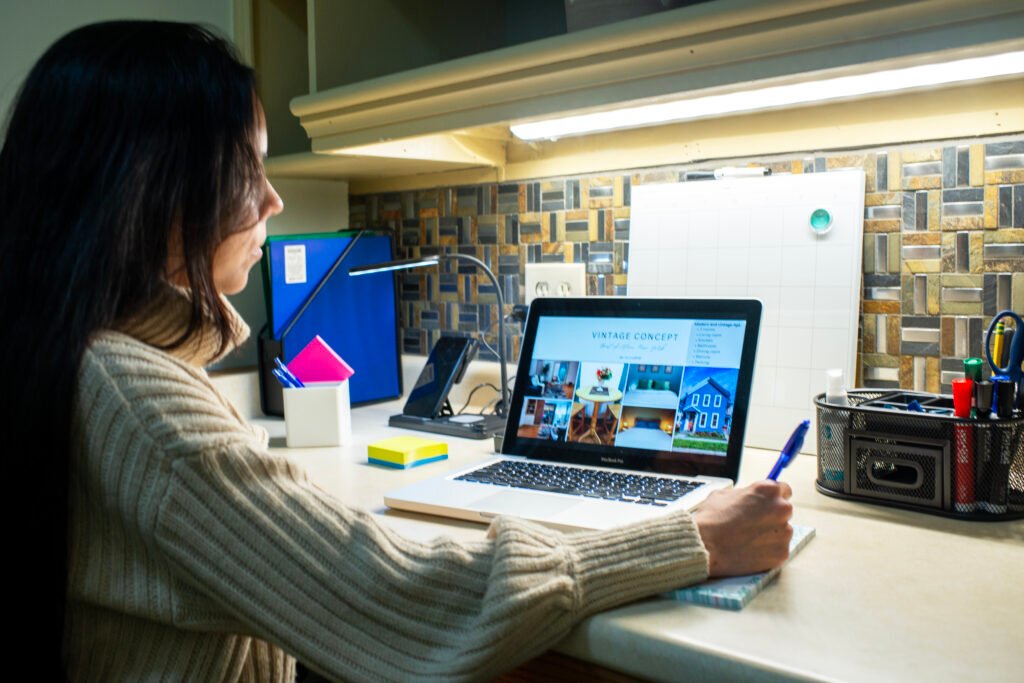The rise of Airbnb, the pioneering home-sharing platform, has presented a complex and multifaceted impact on local cultures around the world. As the platform has rapidly expanded, it has sparked a passionate debate about its influence on the preservation of traditional values, customs, and ways of life within host communities. While proponents argue that Airbnb facilitates cultural exchange and supports local economies, critics contend that the platform’s disruptive influence can erode the authenticity and uniqueness of travel experiences.
At the heart of this discussion lies the fundamental question: does Airbnb’s peer-to-peer model ultimately promote or undermine the cultural traditions that define the very essence of a destination? This article delves into the nuances of this complex relationship, examining the potential benefits and drawbacks of Airbnb’s impact on local communities and their cultural heritage.
Key Takeaways
- Airbnb has the potential to both support and challenge local cultural preservation.
- The platform can facilitate cultural exchange and economic opportunities for host communities.
- However, the rise of professional property management and gentrification can erode the authenticity of travel experiences.
- Regulatory and community efforts are needed to balance the benefits and drawbacks of Airbnb’s presence.
- Embracing sustainable tourism practices and collaborations with local hosts can enhance the cultural experience for visitors.
Introduction to Airbnb's Impact on Local Culture
In recent years, the rise of Airbnb has dramatically transformed the travel industry, offering a unique peer-to-peer hosting experience that has the potential to both promote and erode local cultural traditions. As a business model, Airbnb has disrupted the traditional hotel and vacation rental landscape, empowering individuals to share their homes and embrace the concept of cultural exchange.
The Rise of Peer-to-Peer Hosting
The growth of Airbnb has been fueled by the increasing popularity of peer-to-peer hosting, where individuals can list their homes, apartments, or unique spaces for travelers to experience a more authentic and localized stay. This model has enabled a new wave of sustainable tourism, allowing visitors to immerse themselves in the customs and lifestyles of their destinations.
Key Statistics on Airbnb's Growth
The impact of Airbnb on the global travel industry is undeniable. According to recent data, the platform has over 6 million listings in more than 100,000 cities worldwide, with a presence in nearly every country. This rapid expansion has not only revolutionized the way people travel but has also sparked discussions around the potential benefits and challenges of cultural exchange through peer-to-peer hosting.
As Airbnb continues to grow, it will be crucial to explore its long-term impact on local communities and their cultural heritage, balancing the opportunities for sustainable tourism with the preservation of authentic traditions.
Cultural Benefits of Airbnb for Local Communities
Airbnb’s peer-to-peer hosting model has proven to be more than just a convenient accommodation option for travelers. It has also become a powerful platform for fostering cultural exchange and supporting local economies across the globe. By offering immersive experiences and promoting sustainable tourism practices, Airbnb has become a valuable asset for local communities.
Supporting Local Economies
When guests choose Airbnb accommodations, they are often directed towards local businesses, restaurants, and artisans. This influx of tourism dollars helps to stimulate local economies, providing a much-needed boost for small and medium-sized enterprises. In many cases, Airbnb hosts actively recommend and showcase the unique offerings of their neighborhoods, further enhancing the cultural exchange between visitors and locals.
Fostering Cultural Exchange
The personal nature of Airbnb experiences encourages meaningful interactions between guests and their hosts. Travelers have the opportunity to learn about local customs, traditions, and lifestyles firsthand, fostering a deeper understanding and appreciation of the destination’s cultural heritage. This exchange of ideas and perspectives can lead to lasting connections and a more enriching travel experience for all involved.
Promoting Local Art and Traditions
Airbnb’s platform has also become a powerful tool for highlighting and celebrating local arts, crafts, and cultural practices. Many hosts incorporate elements of their region’s artistic and traditional offerings into the accommodations and experiences they offer, enabling visitors to immerse themselves in the sustainable tourism and immersive experiences that define the local identity.
| Benefit | Description |
|---|---|
| Supporting Local Economies | Airbnb directs tourism dollars to small businesses, restaurants, and artisans, providing a much-needed boost to local economies. |
| Fostering Cultural Exchange | The personal nature of Airbnb experiences encourages meaningful interactions between guests and hosts, leading to a deeper understanding of local customs and traditions. |
| Promoting Local Art and Traditions | Airbnb hosts incorporate elements of their region’s artistic and cultural offerings, enabling visitors to immerse themselves in sustainable tourism and immersive experiences. |
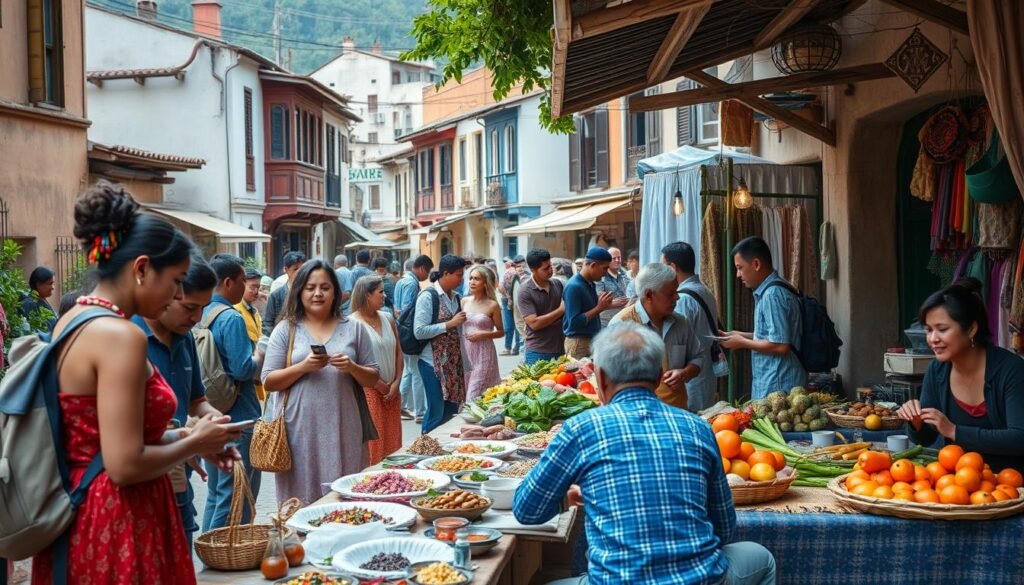
“Airbnb has become a powerful platform for highlighting and celebrating local arts, crafts, and cultural practices, enabling visitors to immerse themselves in the sustainable tourism and immersive experiences that define the local identity.”
The Erosion of Traditional Hospitality
The rise of Airbnb has undoubtedly transformed the hospitality industry, but with this transformation comes concerns about the erosion of traditional hospitality practices. As the platform has expanded, there has been a noticeable shift from individual, local hosts to professional property managers, raising questions about the authenticity and personal touch of guest experiences.
The Shift from Local Hosts to Professional Managers
One of the hallmarks of Airbnb’s early success was the ability for travelers to stay in the homes of local residents, immersing themselves in the culture and community. However, as the platform has grown, a growing number of Airbnb listings are now managed by professional property managers, often operating multiple properties simultaneously. This shift has the potential to diminish the authenticity and cultural preservation that once defined the Airbnb experience.
Impact on Personal Touch and Authenticity
The presence of professional property managers has led to concerns about the loss of the personal touch that was a crucial part of the traditional hospitality experience. Guests may no longer have the opportunity to interact directly with local hosts, who could provide insider knowledge and a deeper connection to the community impact of their stay. This transition away from traditional hospitality practices may erode the sense of cultural preservation that many travelers sought when using Airbnb.

As Airbnb continues to evolve, it will be crucial for the platform to find ways to maintain the personal and authentic experiences that once defined its unique offering, while also addressing the challenges posed by the shift towards professional property management. Striking this balance will be essential for preserving the cultural preservation and community impact that are so deeply valued by both hosts and guests.
Airbnb and Gentrification: A Double-Edged Sword
The rise of Airbnb has undoubtedly transformed the urban landscape, bringing both benefits and challenges to local communities. As the platform has become a popular choice for travelers seeking authentic experiences, its impact on gentrification and urban development has become a subject of heated debate.
The Role of Airbnb in Urban Development
Airbnb’s influence on urban development is undeniable. The platform has enabled homeowners to capitalize on their properties, leading to a surge in short-term rentals in popular tourist destinations. This, in turn, has fueled urban development, with new businesses and amenities catering to the influx of visitors.
Displacement of Long-Term Residents
However, the growth of Airbnb has also contributed to the displacement of long-term residents in these areas. As property values rise and landlords opt to list their units on the platform, affordable housing becomes scarce, and cultural preservation becomes increasingly challenging.
Balancing Development with Preservation
Striking a balance between urban development and cultural preservation is crucial for maintaining the community impact of Airbnb. Cities are exploring innovative strategies, such as regulations and tax policies, to ensure that the economic benefits of short-term rentals are shared equitably and do not come at the expense of long-term residents and cultural preservation.
| Potential Benefits of Airbnb | Potential Challenges of Airbnb |
|---|---|
| Boosts local economies through increased tourism | Contributes to rising property values and displacement of long-term residents |
| Provides additional income for homeowners and hosts | Disrupts traditional hospitality industry and alters the character of neighborhoods |
| Fosters cultural exchange and understanding between travelers and locals | Reduces the availability of affordable housing in popular tourist destinations |
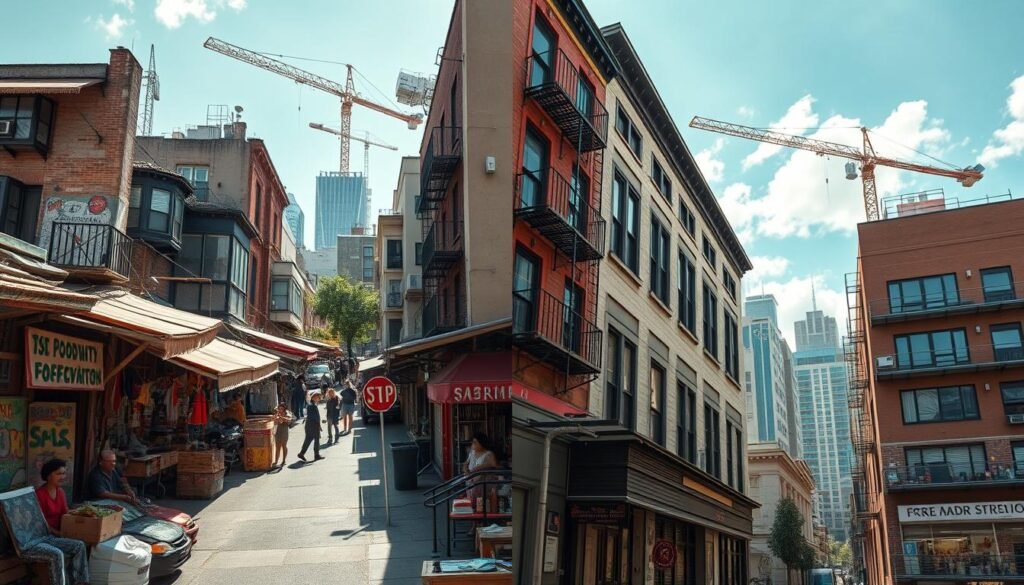
As the Airbnb phenomenon continues to evolve, communities must navigate the complex interplay between gentrification, urban development, and cultural preservation. By exploring innovative solutions and fostering open dialogues, cities can harness the benefits of short-term rentals while mitigating their negative community impact.
Case Studies: Cities Embracing Airbnb Effectively
As the impact of Airbnb on local communities continues to be debated, some cities have found innovative ways to integrate the platform while preserving their unique cultural identities. Two exemplary case studies showcase how cultural tourism, immersive experiences, and sustainable tourism can thrive alongside local culture.
New Orleans: Embracing Cultural Tourism
New Orleans, renowned for its vibrant music, cuisine, and Creole heritage, has embraced Airbnb as a means to showcase its local culture. The city has worked closely with hosts to ensure that visitors experience authentic, immersive experiences, from participating in traditional Jazz brunch to exploring the historic French Quarter. By leveraging the platform’s reach, New Orleans has witnessed a surge in cultural tourism, which has in turn bolstered local businesses and artisans.
Tokyo: Integrating Modern and Traditional Experiences
In the bustling metropolis of Tokyo, Airbnb has found a way to seamlessly blend modern and traditional experiences. Hosts offer guests the opportunity to stay in historic ryokans, or Japanese inns, while also providing access to cutting-edge technology and innovative culinary experiences. This blend of the old and new has fostered a deeper appreciation for Tokyo’s rich cultural heritage, allowing visitors to immerse themselves in the city’s local culture while also experiencing its dynamic, forward-thinking spirit.
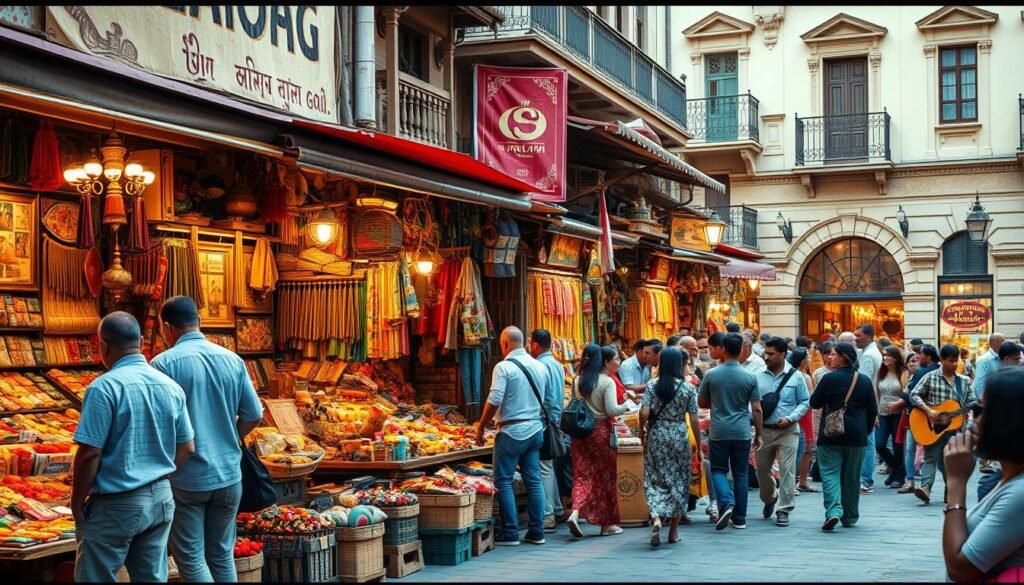
These case studies illustrate how cities can embrace Airbnb as a platform for cultural tourism, immersive experiences, and sustainable tourism, all while preserving the unique local culture that makes them so captivating. By working collaboratively with hosts and communities, these destinations have found a harmonious balance that benefits both visitors and residents alike.
Controversies Surrounding Airbnb Rentals
The rapid growth of Airbnb has not been without its fair share of controversies. As this peer-to-peer accommodation platform has become increasingly popular, it has faced a range of regulatory challenges and community resistance in various destinations around the world. These controversies have significant implications for the impact of Airbnb on local culture and communities.
Regulatory Challenges and Local Laws
One of the primary issues surrounding Airbnb is the ongoing debate over the legality and regulation of short-term rentals. Many cities and municipalities have struggled to keep pace with the rise of Airbnb, leading to a patchwork of local laws and regulations that govern the platform’s operations. Cultural appropriation has also been a concern, as some hosts may misrepresent or commodify local traditions and experiences without proper consideration for the community impact.
Community Resistance and Activism
The presence of Airbnb rentals in residential neighborhoods has also sparked backlash from local communities. Residents have expressed concerns about the gentrification and displacement of long-term residents, as well as the disruption to the character and sense of community. Grassroots activist groups have emerged to advocate for stricter regulations and the preservation of local culture and sustainable tourism practices.
Misleading Representations in Listings
Another area of controversy surrounding Airbnb rentals is the issue of misleading representations in listings. Some hosts may exaggerate or misrepresent the authenticity of the cultural experiences they offer, leading to disappointed guests and potential cultural appropriation. This can undermine the community impact and sustainable tourism efforts that Airbnb claims to support.
As Airbnb continues to grow and expand its global reach, addressing these controversies will be crucial for the platform to balance the needs of local communities, preserve cultural traditions, and promote sustainable tourism practices.
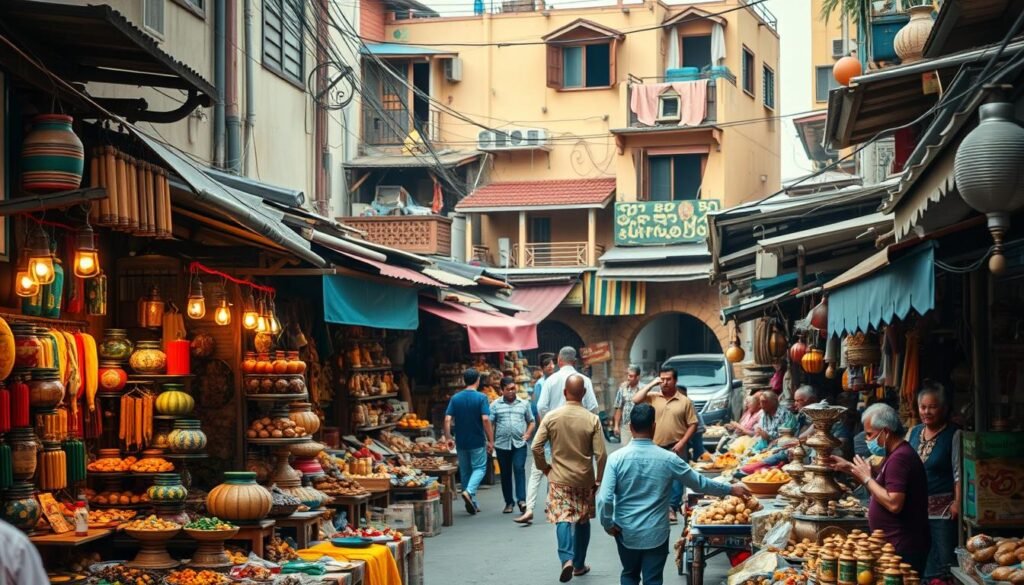
Enhancing the Visitor Experience: Cultural Activities
As Airbnb continues to revolutionize the way travelers experience local culture, the platform has embraced a new era of immersive experiences that go beyond traditional accommodation. Through strategic collaborations with local guides, artisans, and culinary experts, Airbnb is now offering visitors a deeper dive into the heart of the communities they visit.
Collaborations with Local Guides and Artisans
Airbnb’s Experiences program has become a gateway for travelers to connect with passionate local experts who are eager to share their cultural traditions and unique perspectives. From guided tours led by knowledgeable historians to hands-on workshops with skilled artisans, these curated activities provide a level of authenticity and personalization that hotel-based tourism often lacks.
Incorporation of Local Cuisine and Events
In addition to cultural immersion, Airbnb also facilitates a deeper appreciation for local cuisine and festivities. Hosts now offer cooking classes, food tours, and even the opportunity to attend local cultural events, allowing visitors to savor the flavors and rhythms that define a destination’s identity. This approach not only enhances the visitor experience but also supports sustainable tourism practices by channeling economic benefits directly into the local community.
By embracing these innovative approaches to cultural exchange, Airbnb is redefining the boundaries of traditional travel and fostering a new era of immersive experiences that leave a lasting impact on both visitors and the communities they explore.
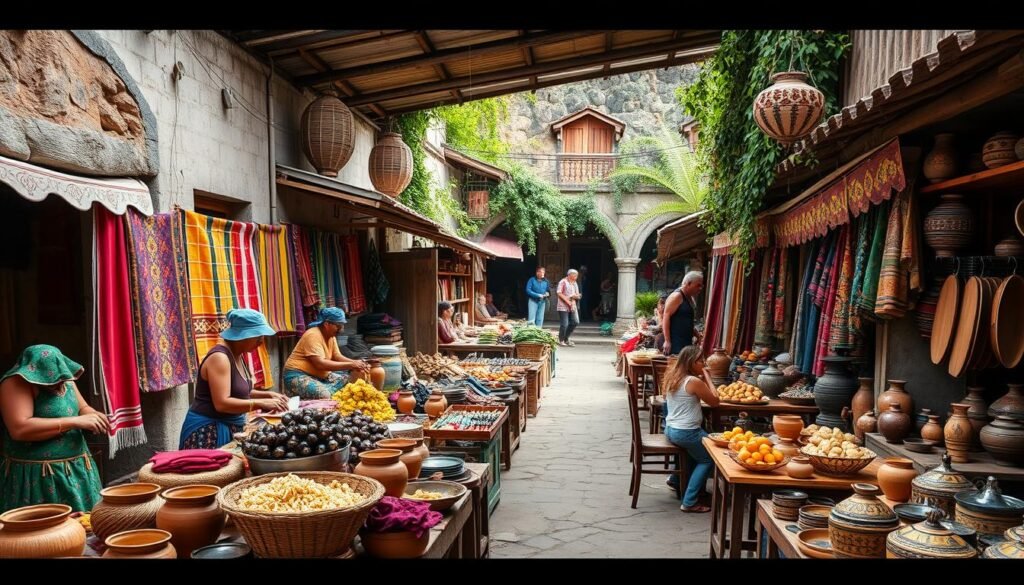
| Cultural Activity | Description | Benefit |
|---|---|---|
| Local Guides and Artisans | Curated experiences led by knowledgeable experts who share their cultural traditions and unique perspectives | Provides authenticity, personalization, and a deeper connection to the local community |
| Local Cuisine and Events | Cooking classes, food tours, and the opportunity to attend local cultural events | Enhances the visitor experience while supporting sustainable tourism practices and channeling economic benefits into the local community |
Perspectives from Local Hosts
As the popularity of Airbnb continues to grow, the perspectives of local hosts provide valuable insights into the complex interplay between cultural exchange, community impact, and sustainable tourism. These independent hosts play a crucial role in shaping the guest experience and preserving the essence of local culture.
Stories of Cultural Engagement
Many local Airbnb hosts take pride in sharing their cultural heritage with visitors, fostering a deeper understanding and appreciation for the community. Anna, a host in Marrakech, Morocco, explains how she introduces guests to traditional Moroccan cuisine, arranging cooking classes that allow them to learn from local chefs. “It’s not just about providing a place to stay; it’s about immersing our guests in the vibrant culture of Marrakech,” she says.
Similarly, Takeshi, a host in Kyoto, Japan, delights in introducing guests to the art of Japanese tea ceremonies and the timeless traditions of the geisha culture. “By sharing these cultural experiences, we hope to inspire our guests to develop a profound respect for the local way of life and the enduring legacies that shape our community,” he remarks.
Challenges Faced by Independent Hosts
- Maintaining authenticity and cultural integrity in the face of growing commercialization
- Navigating complex regulatory environments that may limit their ability to offer unique experiences
- Balancing the needs of guests with the preservation of local traditions and community well-being
As Airbnb continues to evolve, independent hosts like Anna and Takeshi face the ongoing challenge of preserving the local culture and community impact that are at the heart of the cultural exchange and sustainable tourism experience.
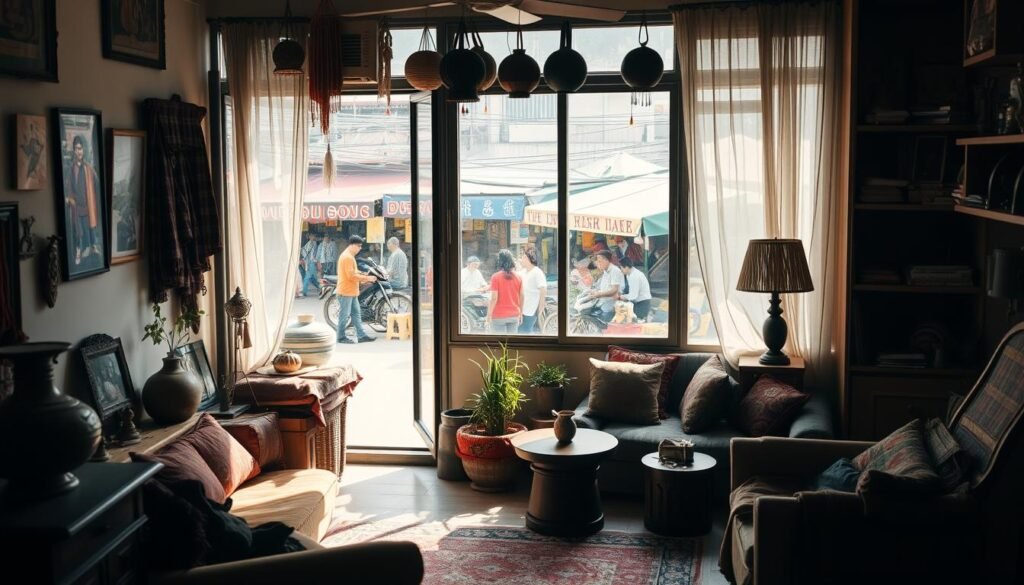
The Role of Technology in Cultural Experiences
As Airbnb continues to revolutionize the hospitality industry, technology has played a pivotal role in enhancing the cultural exchange between hosts and guests. From the use of artificial intelligence (AI) to personalize experiences to the rise of online platforms that facilitate virtual cultural workshops, technology has become a powerful tool for promoting cultural exchange, immersive experiences, and sustainable tourism.
The Use of AI and Personalization
Airbnb’s advanced algorithms and AI-powered recommendations have enabled the platform to match guests with culturally relevant experiences tailored to their preferences. By analyzing guest profiles, travel history, and even social media data, Airbnb can suggest unique local activities, tours, and accommodations that immerse travelers in the authentic culture of their destination. This personalization not only enhances the overall guest experience but also fosters a deeper appreciation for the cultural traditions and sustainable practices of the local community.
Online Platforms and Cultural Workshops
In addition to the Airbnb platform, a growing number of online initiatives have emerged to showcase and preserve cultural heritage. Virtual cultural workshops, for example, allow hosts to share their expertise in traditional art forms, culinary traditions, and local craftsmanship with a global audience. These interactive sessions not only educate participants but also provide a valuable platform for cultural exchange and sustainable tourism practices.
| Technology Feature | Impact on Cultural Experiences |
|---|---|
| AI-powered Recommendations | Personalized cultural experiences for guests |
| Online Cultural Workshops | Promote cultural exchange and sustainable tourism |
As the landscape of short-term rentals and tourism continues to evolve, the integration of technology with cultural experiences has become a crucial component in fostering meaningful cultural exchange, immersive experiences, and sustainable tourism practices.
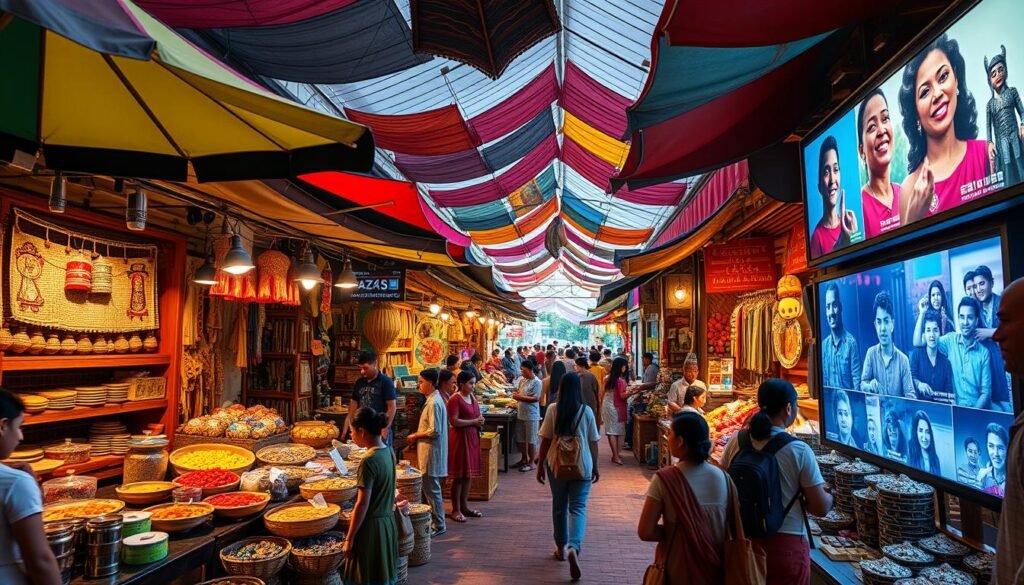
Evaluating the Economic Impact on Traditional Businesses
As Airbnb continues to disrupt the hospitality industry, the traditional businesses, particularly hotels and local enterprises, have faced both challenges and opportunities. Understanding the nuanced economic impact is crucial in navigating the evolving landscape of tourism and hospitality.
Effects on Hotels and Lodging
The rise of Airbnb has undoubtedly impacted the hotel industry, with some hotels reporting a decline in occupancy rates and revenue. The peer-to-peer home-sharing platform has provided travelers with more affordable and unique accommodations, often undercutting traditional hotel prices. This shift has forced hotels to reevaluate their pricing strategies and enhance their offerings to remain competitive.
Opportunities for Local Businesses
- Increased local economies and community impact: Airbnb has the potential to drive more visitors to local neighborhoods, creating opportunities for small businesses, artisans, and service providers to capitalize on the influx of sustainable tourism.
- Promotion of traditional hospitality: Airbnb hosts often showcase and celebrate the unique cultural offerings of their communities, allowing travelers to immerse themselves in authentic local experiences.
- Collaboration with Airbnb: Some local businesses have partnered with Airbnb to offer curated experiences, tours, and activities, further integrating the platform with the community impact.
| Metric | Impact on Hotels | Opportunities for Local Businesses |
|---|---|---|
| Occupancy Rates | Decreased in some markets | Increased foot traffic and visibility |
| Revenue | Decline in certain segments | Increased sales and economic activity |
| Competitive Landscape | Increased pressure to differentiate | Opportunities to showcase local economies and traditional hospitality |
The economic impact of Airbnb on traditional businesses is complex, with both challenges and opportunities emerging. By understanding the nuances and adapting their strategies, hotels and local enterprises can navigate this evolving landscape and capitalize on the potential community impact of sustainable tourism.

Future Trends in Short-Term Rentals and Culture
As the short-term rental market continues to evolve, experts predict significant changes in the industry’s relationship with local cultures and urban development. Airbnb, the dominant player in this space, is expected to play an increasingly important role in shaping the future of sustainable tourism practices and urban landscapes.
Predictions for Airbnb's Role in Urban Settings
Airbnb’s impact on urban areas is expected to become more pronounced in the coming years. With the rise of remote work and flexible lifestyles, the demand for temporary accommodations in cities is projected to increase. Airbnb is likely to capitalize on this trend, expanding its presence in major metropolitan areas and influencing the design and utilization of urban spaces.
Potential for Sustainable Tourism Practices
As the tourism industry faces growing scrutiny over its environmental and cultural impact, the short-term rental market is poised to play a pivotal role in promoting sustainable tourism practices. Airbnb and similar platforms can incentivize hosts to adopt eco-friendly measures, such as energy-efficient upgrades and waste reduction initiatives. Additionally, these platforms may foster collaborations between hosts and local artisans, encouraging the preservation of cultural traditions and the inclusion of authentic experiences for visitors.
| Trend | Impact | Potential Outcome |
|---|---|---|
| Increased Airbnb Presence in Urban Areas | Influence on urban planning and development | Potential for more sustainable and culturally-integrated urban spaces |
| Emphasis on Sustainable Tourism Practices | Incentives for eco-friendly hosting and cultural preservation | Promotion of responsible tourism and the protection of local traditions |
As the short-term rental industry continues to evolve, the interplay between Airbnb, sustainable tourism, urban development, and cultural preservation will be a crucial factor in shaping the future of travel and hospitality. The industry’s response to these trends will have a significant impact on the experiences of both visitors and local communities.
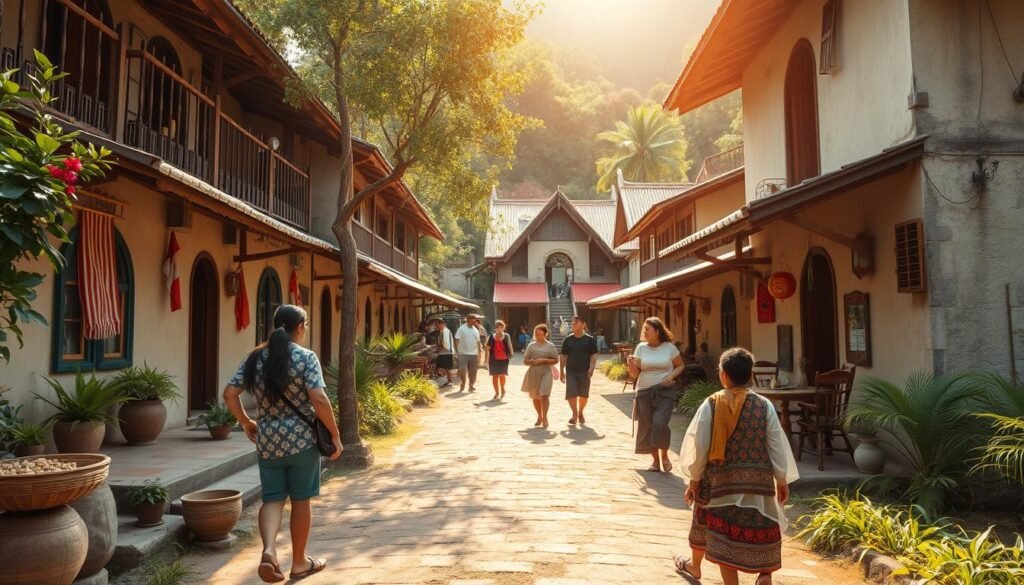
Conclusion: Finding the Balance
As the discussion on Airbnb’s impact on local culture comes to a close, it’s clear that the platform presents a complex and multifaceted challenge. While Airbnb has the potential to support cultural preservation and sustainable tourism, it can also lead to the erosion of traditional hospitality and the displacement of long-term residents, causing significant community impact.
Assessing Long-Term Cultural Impacts
The long-term effects of Airbnb on local culture are still emerging, and communities must carefully monitor and assess these changes. As the platform continues to grow, it is crucial to ensure that the economic benefits do not come at the expense of the local culture and authenticity that attracted visitors in the first place.
Strategies for Harmonious Coexistence
Achieving a harmonious coexistence between short-term rentals and cultural preservation will require a multifaceted approach. This may involve implementing balanced regulations, fostering collaboration between Airbnb hosts and local businesses, and promoting sustainable tourism practices that prioritize the community impact.
| Strategy | Description |
|---|---|
| Balanced Regulations | Developing regulations that address the needs of both Airbnb hosts and the local community, ensuring fair practices and the preservation of cultural assets. |
| Collaborative Partnerships | Encouraging Airbnb hosts to work closely with local businesses, artisans, and cultural organizations to create authentic experiences that showcase the local culture. |
| Sustainable Tourism Promotion | Implementing initiatives that promote sustainable tourism practices, such as eco-friendly accommodations, responsible consumption, and community-based experiences. |
By adopting a balanced approach and fostering collaboration between all stakeholders, communities can harness the benefits of Airbnb while preserving the cultural preservation that makes their destinations so unique and appealing.
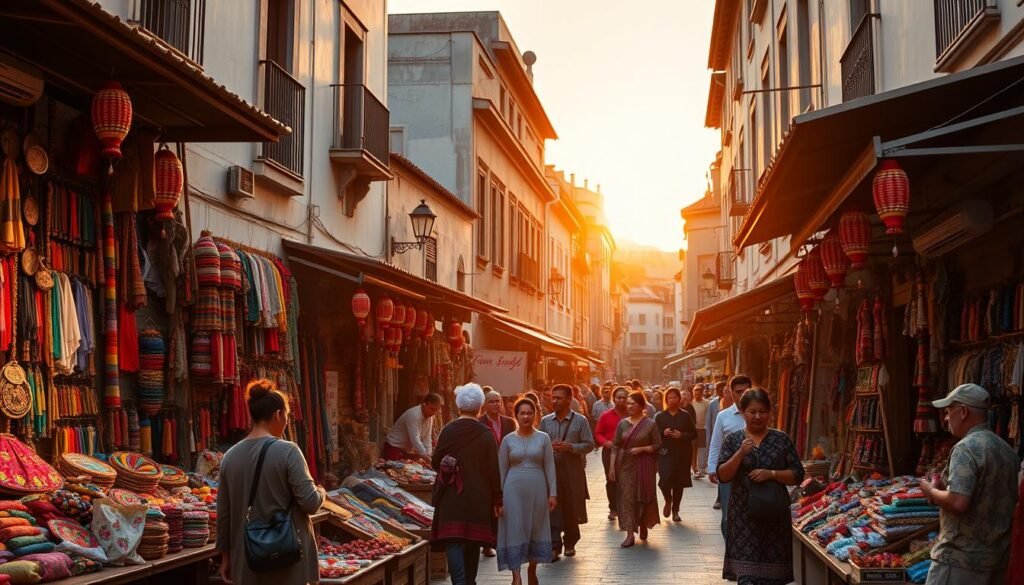
Final Thoughts on Airbnb and Local Culture
As the Airbnb revolution continues to transform the global travel landscape, it’s critical that we approach the relationship between this platform and local cultures with nuance and care. The rise of home-sharing has undoubtedly brought both benefits and challenges to communities worldwide, and it’s our responsibility to ensure that the cultural fabric of these destinations is not irreparably damaged.
Encouraging Responsible Tourism
At the heart of this discussion lies the imperative for responsible tourism. Airbnb hosts and guests must be mindful of their impact on local communities, respecting traditions, supporting small businesses, and preserving the authenticity that draws travelers in the first place. By embracing sustainable practices and fostering genuine cultural exchange, we can harness the power of Airbnb to enrich rather than erode the experiences that make each destination unique.
The Way Forward for Communities and Hosts
Moving forward, communities and Airbnb hosts must work in tandem to navigate the challenges and opportunities presented by the home-sharing platform. Local governments should seek to strike a balance between regulation and innovation, ensuring that Airbnb’s presence benefits residents while mitigating the risks of gentrification and overtourism. Airbnb hosts, in turn, should strive to be ambassadors of their communities, sharing the rich cultural tapestry that defines their homes and fostering meaningful connections with their guests. By embracing this collaborative approach, we can forge a path that preserves the integrity of local cultures while harnessing the transformative potential of Airbnb.
FAQ
How does Airbnb impact local cultures and traditions?
Airbnb’s impact on local cultures and traditions is a complex and multifaceted issue. On one hand, the platform can support local economies, foster cultural exchange, and promote local art and traditions. However, it can also contribute to the erosion of traditional hospitality practices, gentrification, and cultural appropriation in some cases.
What are the potential benefits of Airbnb for local communities?
Airbnb can provide economic benefits by supporting local businesses and creating new income opportunities for hosts. The platform can also foster cultural exchange, allowing travelers to have more immersive experiences and learn about local traditions and customs.
How does Airbnb affect the authenticity of travel experiences?
The shift from individual hosts to professional property managers can impact the personal touch and authenticity of Airbnb experiences. There are concerns about the erosion of local cultural practices in the hospitality sector as Airbnb becomes more commercialized.
What is the relationship between Airbnb and gentrification?
Airbnb can contribute to gentrification in urban areas, as the platform can drive up housing prices and displace long-term residents. However, it can also support urban development and economic growth. Balancing these competing interests is essential for preserving local culture and community.
How can Airbnb enhance the visitor experience through cultural activities?
Airbnb can enhance the visitor experience by collaborating with local guides, artisans, and businesses to incorporate local cuisine, events, and cultural experiences. These initiatives can promote cultural exchange and sustainable tourism practices.
What challenges do local Airbnb hosts face in maintaining cultural authenticity?
Independent Airbnb hosts often face challenges in maintaining the cultural authenticity of their offerings, as they may need to compete with more commercialized and standardized experiences. The role of hosts in promoting sustainable tourism and preserving local traditions is crucial.
How can technology be used to enhance cultural experiences through Airbnb?
Technology, such as AI-powered personalization and online platforms for cultural workshops, can be leveraged to enhance the cultural experiences offered through Airbnb. These tools can facilitate more immersive and authentic interactions between guests and local communities.
What are the potential economic impacts of Airbnb on traditional hospitality businesses?
Airbnb can have both positive and negative economic impacts on traditional hospitality businesses, such as hotels and local lodging facilities. While it can create new opportunities for local businesses, it can also disrupt the traditional hospitality industry and contribute to economic challenges.
What are the future trends in short-term rentals and their impact on local cultures?
As the short-term rental market continues to evolve, Airbnb’s role in urban settings and its potential for developing sustainable tourism practices that balance economic growth with cultural preservation will be crucial considerations for the future.

